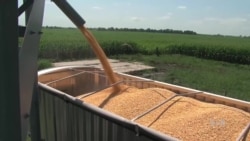Though the corn and soybean fields of Illinois seem a long way from Cuba, farmer Wendell Shauman welcomes the normalization of diplomatic relations with the Caribbean island nation.
Agriculture trade
As he empties last year’s corn crop from a grain storage bin into a waiting truck that will transport it beyond his farm, Shauman said he hopes more of the product he harvests from his fields will soon be making its way to Cuba.
“It’s sure good for agriculture. It’s our market for the taking,” he said, under the intense sun of a warm and humid summer day. “It’s close. The transportation costs are low. We’ve got the products they need.”
And Cuba needs plenty. It currently imports about 80 percent of its food needs, totaling some $2 billion a year. American farmers have gotten a toehold in that market since U.S. restrictions were eased in 2000, shipping about 25,000 tons of poultry to Cuba last year.
US embargo lifted
But the American share has declined recently in the face of increased competition from other countries whose farmers are not legally prohibited from extending credit to Cuba. That's why Shauman is anxious for the U.S. embargo on trade with Cuba to be lifted, and soon.
“There’s competition increasing from especially South America but also Ukraine and sometimes India,” Shauman said. “There’s a lot of competition out there and a market that is close to you, you sure want to grab.”
But not everyone is excited about increasing trade with the former Cold War enemy of the United States. Roger Noriega, a former U.S. ambassador to the Organization of American States, said the potential economic benefits of freer trade with Cuba have been exaggerated.
“There are some folks who have done business in Cuba, who’ve spoken very skeptically about whether there’s any real potential today and that includes agricultural importers, exporters,” Noriega told VOA in an interview.
“I would say [that is] because you want to do business with people you can trust. I don’t think you can trust a dictatorship."
Much of the corn and soybeans that Shauman farms reaches a grain elevator and terminal on the Mississippi River, where his products are eventually transferred to river barges. Their destination, where the grain is offloaded and prepared to travel farther around the world, is the Port of New Orleans, Louisiana.
Creating more jobs
Gary Lagrange, president and CEO of the Port of New Orleans, said an end to the embargo would boost his business and create more jobs at the port.
“Oh it’s going to put a lot more people to work, particularly the transportation sector. We anticipate here in New Orleans more ships servicing Cuba and vice versa, the same thing.”
Lagrange said the port is already getting a taste of what’s to come should the embargo end thanks to the Trade Sanction Reform and Export Enhancement Act signed into law by President Bill Clinton in 2000. The act allowed some exports of agricultural, medicine, and medical devices to reach Cuba while keeping the economic embargo in place.
“So this last year, as an example, we shipped actually 25,000 tons of poultry to Cuba, so we’re already in business with them now and that’s only going to escalate and get a lot better,” said Lagrange. “Once the embargo is lifted – we’re estimating an uptick of anywhere from 10 to 15 percent of our entire volume, our entire business if you will. That’s a substantial amount since we’re one of the top five or six ports in the United States.”
He said it’s not just the exports from the U.S. that would increase, but imports from Cuba as well.
“Prior to the embargo, Cuba’s largest trading partner was the port of New Orleans. At that time there was a lot of sugar, coffee, a lot of products that were grown in Cuba. We look forward to a return to that as well as a lot of new products as well.”
New investments will boost economy
But Carlos Gutierrez, a former U.S. secretary of commerce, argued that Cuba will have to loosen its strict central control of its economy and adopt capitalist practices if it hopes to benefit from increased trade with the United States.
Cuba needs new investment and that will not come unless investors can expect a financial return, said Gutierrez, who spoke recently at a U.S.-Cuba trade panel hosted by the Atlantic Council research organization in Washington.
“If you allow farmers to make a profit, they will produce more,” he said.
Noriega's objections to ending the embargo go beyond the economic arguments, involving the morality of doing business with Cuba as long as the communist regime of the Castro family remains in power.
He argues that the current Cuban government is “using what profits it derives from this trade to suppress people. I don’t think that’s something people want to do in good conscience.”
But for Illinois farmer Wendell Shauman, Cold War animosities are a thing of the past.
“For us, we’re looking at it as a market,” he said. “We let the politicians worry about the politics and the talking heads. I don’t think there is a strong feeling one way or another. There is some sympathy for the people who got ran out of there 50 years ago but that happens around the world and there’s not a lot we’re going to do about it in the middle of western Illinois.”
Shauman is also realistic about the impact of increased trade with Cuba on the global economy.
“It’s not a very big market, so it’s not going to be a big shakeup in the balance sheet of U.S. grain or the world grain market.”
Even so, agriculture experts say an end to the embargo could triple U.S. exports to Cuba by 2020.






